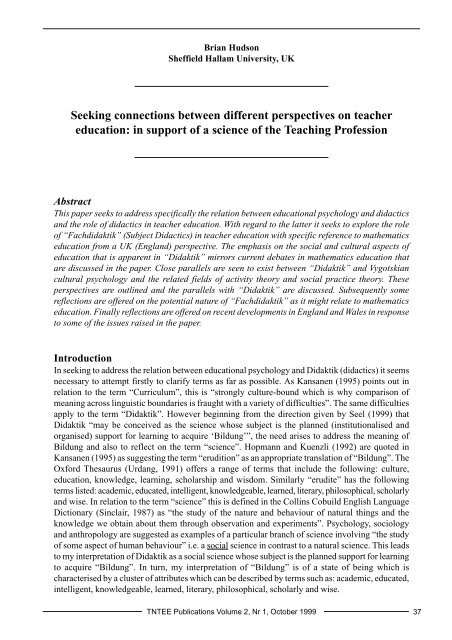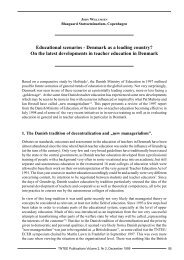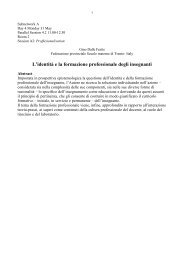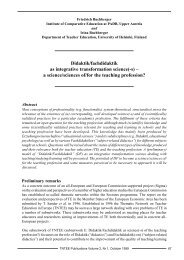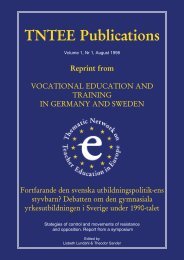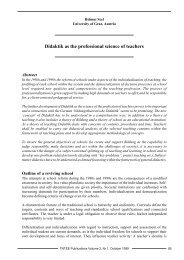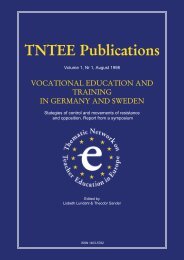TNTEE Publications - Didaktik/Fachdidaktik
TNTEE Publications - Didaktik/Fachdidaktik
TNTEE Publications - Didaktik/Fachdidaktik
Create successful ePaper yourself
Turn your PDF publications into a flip-book with our unique Google optimized e-Paper software.
Brian Hudson<br />
Sheffield Hallam University, UK<br />
Seeking connections between different perspectives on teacher<br />
education: in support of a science of the Teaching Profession<br />
Abstract<br />
This paper seeks to address specifically the relation between educational psychology and didactics<br />
and the role of didactics in teacher education. With regard to the latter it seeks to explore the role<br />
of “<strong>Fachdidaktik</strong>” (Subject Didactics) in teacher education with specific reference to mathematics<br />
education from a UK (England) perspective. The emphasis on the social and cultural aspects of<br />
education that is apparent in “<strong>Didaktik</strong>” mirrors current debates in mathematics education that<br />
are discussed in the paper. Close parallels are seen to exist between “<strong>Didaktik</strong>” and Vygotskian<br />
cultural psychology and the related fields of activity theory and social practice theory. These<br />
perspectives are outlined and the parallels with “<strong>Didaktik</strong>” are discussed. Subsequently some<br />
reflections are offered on the potential nature of “<strong>Fachdidaktik</strong>” as it might relate to mathematics<br />
education. Finally reflections are offered on recent developments in England and Wales in response<br />
to some of the issues raised in the paper.<br />
Introduction<br />
In seeking to address the relation between educational psychology and <strong>Didaktik</strong> (didactics) it seems<br />
necessary to attempt firstly to clarify terms as far as possible. As Kansanen (1995) points out in<br />
relation to the term “Curriculum”, this is “strongly culture-bound which is why comparison of<br />
meaning across linguistic boundaries is fraught with a variety of difficulties”. The same difficulties<br />
apply to the term “<strong>Didaktik</strong>”. However beginning from the direction given by Seel (1999) that<br />
<strong>Didaktik</strong> “may be conceived as the science whose subject is the planned (institutionalised and<br />
organised) support for learning to acquire ‘Bildung’”, the need arises to address the meaning of<br />
Bildung and also to reflect on the term “science”. Hopmann and Kuenzli (1992) are quoted in<br />
Kansanen (1995) as suggesting the term “erudition” as an appropriate translation of “Bildung”. The<br />
Oxford Thesaurus (Urdang, 1991) offers a range of terms that include the following: culture,<br />
education, knowledge, learning, scholarship and wisdom. Similarly “erudite” has the following<br />
terms listed: academic, educated, intelligent, knowledgeable, learned, literary, philosophical, scholarly<br />
and wise. In relation to the term “science” this is defined in the Collins Cobuild English Language<br />
Dictionary (Sinclair, 1987) as “the study of the nature and behaviour of natural things and the<br />
knowledge we obtain about them through observation and experiments”. Psychology, sociology<br />
and anthropology are suggested as examples of a particular branch of science involving “the study<br />
of some aspect of human behaviour” i.e. a social science in contrast to a natural science. This leads<br />
to my interpretation of <strong>Didaktik</strong> as a social science whose subject is the planned support for learning<br />
to acquire “Bildung”. In turn, my interpretation of “Bildung” is of a state of being which is<br />
characterised by a cluster of attributes which can be described by terms such as: academic, educated,<br />
intelligent, knowledgeable, learned, literary, philosophical, scholarly and wise.<br />
<strong>TNTEE</strong> <strong>Publications</strong> Volume 2, Nr 1, October 1999 37


